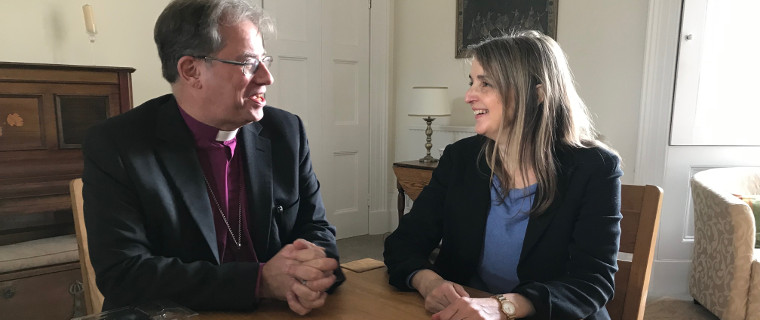
The three most common questions about how to pray (Bishop Steven on having coffee with the Lord)
Do you have questions that get in the way when you're praying? Niggling doubts that whisper: 'Have I got this right?' If so, you're not alone.
Even those who might seem 'experts' face these challenges, as Michelle Eyre found out when she interviewed Bishop Steven Croft, of Oxford Diocese, UK.
Here, in Celia Clark's distillation of the interview, Michelle reveals the three most common questions Discovering Prayer participants ask about prayer. You can read what Bishop Steven had to say about them, when she met him in the beautiful grounds of Christ Church, Oxford.
- How to find time to pray when life gets busy?
- How to know if you're hearing God's voice?
- Is there a power in silent prayer and if so why?
How to find time to pray when life gets busy?
There are no prizes for guessing the most common question people ask us at Discovering Prayer. In fact, 65% of the people who completed our Advent survey share this challenge: how do I find time to pray?
Does this day sound familiar: you're at the gym by 6am, dinner's in the slow cooker before you drop the kids at school, lunchtime you've got a debt planning meeting with a charity, and you've agreed to pop in on an elderly neighbour between getting home and football training?
When you're juggling family, work and just life, it's easy for your own needs to slip to the bottom of your to-do list. In fact, it would be surprising if most of us have even put our spiritual wellbeing on the list?
Bishop Steven is certainly juggling many commitments, balancing his roles in the Oxford Diocese and the House of Lords with writing and speaking engagements.
Here's what he said when Michelle asked him how he finds time to pray.
'Well, everyone is different and so my way of finding time to pray may not be yours or anyone else's. But I've found, over many, many years, that the only way to find time to pray is the first thing in the morning when I get out of bed. So the first thing I do when I get out of bed is to make a cup of coffee. The second thing I do, is to go to the place I have in my home for prayer and I sit there and I pray. And that's the moment to make time. Sometimes there is later in the day and often there will be time when I'm with other people in worship and prayer. In terms of personal prayer it has to be first thing in the morning.'
But what if you're not an early bird? Or you don't like coffee?! Well, you don't have to follow Bishop Steven's example exactly, but we can take some lessons from it. As he says, we've each got to find what works for us.
Four Tips to Make Time to Pray inspired by Bishop Steven Croft, Oxford
These are the key things that came through in his comments. See if they help you think about ways to make more room for prayer in your life.
1. Remember the three Ps for prayer: Pick a time, Prioritise it and Protect it. Establishing a habit is key. In Bishop Steven's case, starting the day with prayer before anything else has had time to interrupt him, guarantees it happens. Crucially, he doesn't look at time-stealing technology until after this time.
So what's your favourite time for praying: early morning, sundown, midnight? What else might that conflict with? What routines or commitments could you change to protect that time?
You can get more help on this in our blog Seven Ways to Learn to Pray Without Ceasing.
2. Accept that making time to pray will take a little sacrifice. Things worth doing are rarely handed to us on a plate. Bishop Steven goes on to say that, to ensure his morning prayer happens:
'Often it means getting up a little (well quite a lot) earlier than I would otherwise rise.'
Could you go for a prayer walk in your lunch hour instead of eating at your desk? (OK, so not much of a sacrifice unless it's raining!). Or swap your half hour TV soap for something more 'real' in the form of prayer?
Here is a useful tip: focusing on how you will feel after praying helps get over the pain when you think about what you're missing.
3. Create a ritual 'bridge' to help create a daily prayer time. When people are changing their behaviour, such as starting running to get fitter, the advice is to create a ritual, such as changing into running gear and trainers as soon as you get home. This creates a 'bridge' to your activity, making it more likely to happen.
Bishop Steven's bridge from sleep to prayer is brewing his early morning coffee. He went on to explain how important this simple act is:
'It's a little ritual, you can't go straight from sleep to prayer, there needs to be something in between, and the little ritual of going downstairs into the kitchen, and putting the coffee maker on and making a cup of coffee, is the bridge and then going into the place I have to pray, is all a kind of step which helps me to settle into prayer.
'At the heart of the Christian faith is friendship with God, and I love the idea of just sitting down and having a cup of coffee with the Lord first thing in the morning.'
What a wonderful picture: sharing a coffee with the Lord. It makes prayer seem so inviting, suddenly less of a test and more of a treat.
So what's your ritual bridge? Maybe it's putting on a favourite piece of music or lacing up your walking boots?
4. Pray in the same place. Where you pray can really impact whether you pray. Bishop Steven has a place for prayer in his home, and you can do the same.
It doesn't necessarily mean setting somewhere aside for prayer, it just means choosing a space where you feel comfortable and can be undisturbed. Of course, it's a bonus if it has a beautiful or inspiring view, but you could always decorate it with inspiring pictures or words instead.
If you'd like you can find out more about our Discovering Prayer app to help you get into a routine of prayer.

How to know if you're hearing God's voice?
The next most frequently asked question may well cross your mind on a pretty regular basis: How do I know I'm hearing God? It's a challenging question, and one that makes the practicalities of finding time seem simple in comparison to the mysteries of tuning into the Lord's voice.
Learn to recognise God's voice
Bishop Steven shared some wise words of advice, based on years of practice listening for God's response to his prayers. But even a Bishop doesn't always find it easy to decipher God's instructions and he warned that the way forward can be clouded by complexity and our own limitations.
'I think, over the years, you do learn to recognise God's voice in different things. Jesus says he's the good shepherd, and we learn to hear his voice, so some of it is accumulated experience and learning to tune in a little.'
He's made a subtle distinction that it's not necessarily always about hearing God's voice, but recognising God in different things. God may or may not choose to 'speak' to us in straightforward sentences, like a friend might share their counsel. We need to tune in with our other senses too: sight, touch, intuition. The secret is to let God be God. We are in a relationship that is of God's choosing. Sometimes God may speak to us, and sometimes guide us by bringing to mind Bible verses, or through other people or life events.
Test to discern if what you believe you hear truly is from God
But what if we really want to believe something: can that falsify what we are hearing? A bit like creating our own echo chamber that bounces back thoughts confirming what we want to hear.
Bishop Steven takes steps to avoid this:
'Sometimes you really have to test what you believe you're hearing God saying, particularly if there is anything at stake in terms of a major decision. And you test what you believe God is saying in lots of different ways: against your reading of the scriptures, in conversation with wise friends, and sometimes in vocational conversation if there's a vocational call.
'So what one believes God is saying, there needs to be a way to test and discern, but it begins with making that time available so you can hear, and then having a sense of God's voice and the way in which God speaks to you.'
Experience shows that God's voice becomes more familiar over time, the more we listen and hear. That makes sense, since the better you get to know someone, the more likely you are to notice them talking in a noisy room. So some of it is about persistence. Have you found this too? Look back over the times you've thought you've heard God: was there any pattern to these instances? Were you in a similar place, or feeling a particular emotion?
What do we do with those experiences? Do we test them as Bishop Steven says – talking to others about them – or do we keep them locked away, fearful that people might not believe us? Our confidence, or lack of it, comes into play here: why would God speak to little me? But why wouldn't God speak to each of us?
Prayer starts with God, the author and creator, though sometimes we don't recognise God's voice. Here are some words of God's guidance for us, like that of a child.
'When Israel was a child, I loved him,
and out of Egypt I called my son.
But the more they were called,
the more they went away from me.
They sacrificed to the Baals
and they burned incense to images.
It was I who taught Ephraim to walk,
taking them by the arms;
but they did not realize
it was I who healed them.
I led them with cords of human kindness,
with ties of love.
To them I was like one who lifts
a little child to the cheek,
and I bent down to feed them.' (Hosea 11:1-4; NIV)
Bishop Steven clearly believes that God speaks to us all, as he went on to say:
'God is very personal and I think speaks in different ways to different people. And speaks in different ways in different life stages, because we change as we get older, and accumulate wisdom and sometimes accumulate hard things that we carry as well. So God speaks in slightly different ways in different stages in our lives.'
Recognising that some decisions are complex and require time and careful thought
Michelle asked Bishop Steven to say a bit more about what God speaking in different ways in different life stages, has meant for him.
'I think it's meant being more careful. I think at an earlier stage of life, I'm in my 60s now, when I was in my 20s or 30s, I would go often instantly from thinking I thought I had heard God say something, to doing it.
'I have learnt to slow down and some of the decisions I need to take as a bishop, are very complex decisions and complex decisions are best taken slowly, with a multitude of advisors and different counsel.
'And I think therefore [it has meant] sitting with what you believe God is saying in a situation, and sometimes sitting with the complexity of it as well, and the pain of it, because not every situation has a straight forward solution.
'Also knowing yourself in a situation, and when you're in danger of making a decision that's in line with your comfort zone or your own character faults and traits, so all of those things are important, so slowly and carefully is the way to respond to what you believe God is saying.'
'Slowly and carefully is the way to respond to what you believe God is saying': this really resonated with Michelle. Patience isn't her strong point but she has learned to slow down, as you can read in our blog Michelle's story.
Learning from the ancients about how to hear God's voice
We can also learn about discerning the voice of God from the ancient path of Ignatius of Loyola.
Ignatius believed God speaks to us through the deepest desires of our heart. Therefore we need to pay attention to our motives or 'spirits' (our inner world of thoughts, feelings, ideas and inspiration) to understand how we might be being directed by God's will, or just our own.
Ignatius talks about the discernment of these inner spirits as being the understanding of these motives at work, and the accompanying sense of 'consolation' and 'desolation'.
Margaret Silf explains in Inner Compass: An Invitation to Ignatian Spirituality:
'Spiritual consolation is experienced when our hearts are drawn toward God, even if this happens in circumstances that the world would regard as negative. It is a signal that our hearts, at least for that moment, are beating in harmony with the heart of God. Consolation is the experience of this deep connectedness to God, and it fills our being with a sense of peace and joy.'
The state of 'consolation' comes about when our own desires are aligned with God's. In choosing to follow the thoughts, feelings and ideas associated with consolation, we know that we are acting on God's will.
In his book A Friendship Like No Other: Experiencing God's Amazing Embrace, William A. Barry SJ sums this up:
'Paul's letter to the Galatians lists the fruit of the Spirit as 'love, joy, peace, patience, kindness, generosity, faithfulness, gentleness, and self-control' (5:22-23). When you experience this group of movements in your being, you can be relatively sure that God's Spirit is moving you.'
If you'd like, you can find out more about our Discovering Prayer app to help you get into a routine of prayer.

Is there a power in silent prayer and if so why?
The last question that we get asked time and again is Why do we have silence with prayer? So Michelle put this to Bishop Steven: Is there a power in silent prayer and if so why?
He talked about the different sorts of silence we can encounter and, reassuringly, explained that things disrupt that silence, even for him.
'I think the silence is a really good, important thing when we pray, but I think there are different kinds of silence, and different things are going on in the silence.
'I'm a person who enjoys technology, and the more I enjoy technology the more I find it difficult to be silent in prayer. So I almost need to go through a digital detox, so one of my New Year's resolutions has been to try not to look at my devices from before I go to bed until when I've prayed in the morning. It's quite hard, I don't always do it, but that helps me to be still and to concentrate.'
What other things are getting in the way of your silence? As Bishop Steven says, technology including social media can overtake, but so can planning, worry and overwork.
Silence is about creating a space, so that we can be refreshed and renewed by God. Time to listen to God, but also to enjoy being in God's presence. If we are too full of our own thoughts and distractions we cannot really appreciate God's presence.
Bishop Steven went on to explain what he does to put aside that busyness of mind so he can experience a calm and quiet soul.
'There's a sort of settling silence, which I think is really important. There's a silence which is about untangling stuff that's going on in my head, and one of the things I do a lot is to journal. I find journaling gets the knots out of my mind. I can put things in order on paper and see them more clearly.'
This resonates with Psalm 131: 'I have calmed and quieted my soul'. Part of the power in the silence is giving you an opportunity to pause, step back and see things from a different perspective. The Bishop uses journaling to do this. Michelle takes a regular prayer walk.
Walking is great for settling into silence because the exertion changes your physiology. It can almost physically shift our thoughts. We can see things differently, and can put the thoughts aside in order to be present with God, what Bishop Steven calls 'a companionable silence, when one is just trying to be with God.'
He added:
'Sometimes there's a silence in which God is being silent and not speaking. That can be for different reasons, and sometimes that can last a while, but I find the most important effect of those silences is that it draws me deeper and makes me wait longer and listen harder and that is a testing thing, but a good thing.'
Think back to Bishop Steven's comment about our faith being a friendship with God. We have all sorts of conversations with our friends, don't we? Catching up, gossip, chat: it's full of noise, banter and laughter.
But deeper relationships are formed through quieter conversations: the ones when you are helping someone to sort out a problem or work through strong emotions. Those times, your silence is powerful because it allows them time to think and change.
Marcus Tullius Cicero, Roman statesman and philosopher, said: 'Silence is one of the great arts of conversation'. And it's true; you can't form a real relationship if you're talking all the time. To truly understand someone, we have to be silent so we can listen and understand what they are really saying, thinking and feeling.
And it's exactly the same in our friendship with God. To get to know God and to allow God into our thoughts and being, so we build a deep mutual trust and understanding, we have to sit together in silence.
If you feel drawn to exploring God in silence, read our blog on Listening to God and Stilling Our Wandering Mind.
We all experience questions about prayer that leave us wondering 'am I doing this right'?
- Bishop Steven's tips for the first one, How to find time to pray when life gets busy? include finding a regular time for prayer that fits your routine and body clock, and having a ritual action, like making a coffee, that signals your intention to pray and creates a 'bridge' into prayer.
- The second question How to know if you're hearing God's voice occurs to us all at some point and Bishops are no exception. Over time, familiarity will grow our confidence in recognising God's voice, but he says we need to slow down our response and test what we think we've heard, especially in complex situations.
- The final question asks Is there a power in silent prayer? Bishop Steven uses journaling to settle into the silence. He finds the richest silence is the one that comes from God as it draws him deeper and makes him wait and listen harder. Not easy, but rewarding.
The final words go to Ruth Burrows, a Carmelite Nun and therefore another person that might be labelled an 'expert' in prayer. Here is what she writes in her book Our Father:
'Most of us find it almost impossible not to think of prayer as a special activity in life, as an art that can be taught or learned rather as we can learn to play a musical instrument, and so some of us are quick to feel we are proficient and others that we are painfully slow, are missing out on some secret or have some lack in our nature which makes prayer difficult if not impossible for us. We feel there are certain laws governing prayer, and techniques to be mastered, and when we have hold of these we can pray.
'Thus we look around for the guru, for the one who has mastered the art and its techniques, and eagerly look to be taught. When we take up a book or article on prayer, we shall probably detect, if we stop to think, that we are looking for the key, the magic formula that is going to put our prayer right, enable us to ‘make a go’ of this mysterious activity called prayer. We may feel that others seem to take it in their stride but somehow it does not work for us and anxiously we look hither and thither for someone who will hand us the secret.
'All this is proof enough that we are overlooking the fundamental facts: that prayer is not a technique but a relationship; that there is no obstacle, no problem. The only problem is that we do not want God. We may want a ‘spiritual life’, we may want ‘prayer’, but we do not want God. All anyone can do for us, any guru can teach us, is to keep our eyes on Jesus, God’s perfect, absolute friend.'
If you'd like, you can find out more about our Discovering Prayer app to help you get into a routine of prayer.


